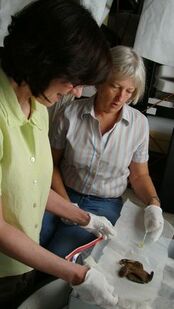Our Approach

Our approach to collections care issues is comprehensive and broad based. The services we offer cover a wide spectrum, from environmental evaluation and storage design, to the formulation and implementation of complex treatment for works on paper and paintings, to technical analysis and support for art historical study.
Preservation Planning
Preservation planning is the cornerstone of a comprehensive collections care program. An effective collections care program is composed of a series of related activities that build upon one another over the course of a defined period of time. A collections care program begins with a general preservation planning survey, a professional review that provides an overview of all factors that affect collections care. The general preservation planning survey offered through BACC’s Western Region Field Service Program addresses all factors that affect collections care: staffing and training, policies and procedures concerning the use of collections, storage and exhibition conditions, the museum environment, security, and emergency preparedness. Prioritized recommendations specific to the collection and institution are included. The activities, tasks, and outcomes integral to successful preservation planning are described at collections care overview.
Preservation Planning
Preservation planning is the cornerstone of a comprehensive collections care program. An effective collections care program is composed of a series of related activities that build upon one another over the course of a defined period of time. A collections care program begins with a general preservation planning survey, a professional review that provides an overview of all factors that affect collections care. The general preservation planning survey offered through BACC’s Western Region Field Service Program addresses all factors that affect collections care: staffing and training, policies and procedures concerning the use of collections, storage and exhibition conditions, the museum environment, security, and emergency preparedness. Prioritized recommendations specific to the collection and institution are included. The activities, tasks, and outcomes integral to successful preservation planning are described at collections care overview.
Planning Surveys
In-depth surveys provide a level of information beyond what is identified through a general preservation assessment.
Funding
Institutions typically depend upon grant-based funding to support a range of preservation and conservation activities, from surveys to environmental improvements, to the treatment of individual objects. A long-range preservation plan that sets out tasks, time lines, and realistic goals is key to funding preservation projects. BACC can assist institutions with project design and identifying sources of support (visit this page to learn more). BACC also provides technical assistance and review of written materials at all stages of program development to ensure the most competitive grant application.
Next Steps
BACC staff has years of experience in helping institutions of all sizes, from small museums and historical societies putting in place their first collections care program to large institutions launching collection-specific initiatives that encompass a broad spectrum of conservation activity, such as surveys, rehousing, environmental improvements, technical analysis, research, and treatment. We are rooted in history, but use cutting-edge technology and best practices to ensure your institution will receive the best services and recommendations possible.
In-depth surveys provide a level of information beyond what is identified through a general preservation assessment.
- A collection-specific survey centers on a specific subset or class of objects within an institution. As with a general preservation assessment, the conservator evaluates all institutional factors that impact the collection. The creation of a rehousing plan, which can support grant applications for such a project, is one example of an outcome of such an assessment.
- An item-by-item survey provides a more detailed level of assessment for a specific group of objects and is generally undertaken in preparation for a treatment program. Treatment proposals, produced in preparation for a treatment program or grant proposals to support such work, are logical outcomes of such as survey.
- A hazard survey is the first step in developing an emergency preparedness program that is tailored to an institution’s specific needs and circumstances. Survey reports provide observations, recommendations, and resources to better manage and mitigate risk as well as to develop an Emergency Preparedness and Response Plan.
Funding
Institutions typically depend upon grant-based funding to support a range of preservation and conservation activities, from surveys to environmental improvements, to the treatment of individual objects. A long-range preservation plan that sets out tasks, time lines, and realistic goals is key to funding preservation projects. BACC can assist institutions with project design and identifying sources of support (visit this page to learn more). BACC also provides technical assistance and review of written materials at all stages of program development to ensure the most competitive grant application.
Next Steps
BACC staff has years of experience in helping institutions of all sizes, from small museums and historical societies putting in place their first collections care program to large institutions launching collection-specific initiatives that encompass a broad spectrum of conservation activity, such as surveys, rehousing, environmental improvements, technical analysis, research, and treatment. We are rooted in history, but use cutting-edge technology and best practices to ensure your institution will receive the best services and recommendations possible.
